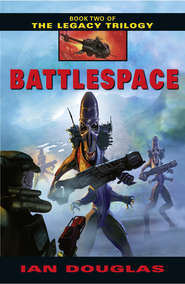По всем вопросам обращайтесь на: info@litportal.ru
(©) 2003-2024.
✖
The Complete Legacy Trilogy: Star Corps, Battlespace, Star Marines
Настройки чтения
Размер шрифта
Высота строк
Поля
Glasses! He’d never heard of the things, though he realized now that he had seen them before, in various downloads of historical scenes and images from a century or two back. Two pieces of glass ground to precise optical properties, held just in front of the eyes by a plastic framework that hooked over the ears and balanced on the bridge of the nose … Once, evidently, they’d been quite fashionable, but the advent first of contacts, then of the dual technologies of genetic engineering and corrective visual nano, had sent them the way of the whalebone corset and silk necktie.
Those recruits whose parents had selected for perfect vision before their births didn’t need visual correction. About half of the company, however, had had nano implants as part of their cerebralinks—submicroscopic structures that both allowed images and words to be projected directly onto the retina and, as an incidental side issue, subtly changed the shape of the cornea and of the eyeball itself to allow perfectly focused vision. Contact lenses, it had been decreed, were too dangerous, too likely to be smashed into the eye in pugil stick practice, a fall on the obstacle course, or hand-to-hand training. Glasses, with unbreakable transplas lenses, might fly off the face but they wouldn’t blind a careless or unlucky recruit. And, unlike contacts, glasses could be taken off and cleaned in the field with the swipe of a finger after a fall in the platoon mud pit.
They just looked as ugly as sin … and twice as silly. Why, Garroway wondered, couldn’t they just inject them all with a specialized antinano that neutralized the neural chelates but left stuff like vision correctives?
Several times so far in his service career he’d heard people refer to how there were three ways of doing anything—the right way, the wrong way, and the Corps’ way.
He decided that he was going to have to get used to the occasional seeming irrationality, to accept it as a normal part of this new life.
It was that or go mad.
Headquarters, USMCSPACCOM
Quantico, Virginia
United Federal Republic, Earth
1415 hours ET
Colonel T.J. Ramsey wondered what megalomaniac had designed this program.
A dozen Marine officers hovered in space, like gods looking down upon the glowing red-gold, brown, and violet sphere representing distant Ishtar. A window had opened against the planet, revealing an orbital survey map of the New Sumer region along the north coast of the continent called Euphratea. The sense of sheer power was almost hypnotic.
Colonel Ramsey was completing the mission briefing. “That’s it, then,” he said. He gestured, and lines of green light flared against the map of the city, outlining perimeters, zones of fire, and LZs. “The initial landings will seize control of the city of New Sumer and the immediate area, with special attention paid to gaining control of the Pyramid of the Eye. That will be the Regimental Landing Team HQ.” Another window opened, enlarging the map area around a prominent rise west of the city. “Before that happens, however, we will need to neutralize Mount An-Kur. That will be the particular task of your Advance Recon Landing Team, Captain Warhurst.”
The briefing room, if it could be called that, was being projected inside the minds of the participants, some of whom were at Quantico, others as far away as the Derna, in high Earth orbit. The icon representing Captain Martin Warhurst wore Marine grays, which were somewhat outmoded on the fashion front. Just three weeks back from Egypt, he’d not had time to update his personal software, what with endless rounds of debriefings and the work he was putting into his latest assignment—the Llalande Relief Expedition ARLT. In contrast, most of the others at the virtual briefing flaunted the latest Marine officer’s fashion, duotone white and gold tunics over blue trousers, both with red trim, and with a holographic globe-and-anchor projected above the left breast. Ramsey wondered how many of them wore the new uniforms outside of virtual reality. They looked peacock-gaudy in the briefing feed; few field commanders, however, bothered with the game of fashion keep-up so popular with the stateside Corps brass.
“I’d still feel better about this if we just rocked ’em from orbit,” Warhurst said. “This giant gun or whatever it is they have inside the mountain … if it can claw starships out of the sky, how the hell are we going to even get close?”
Colonel Ramsey nodded. “I know. But we have very specific orders on this one. I already tried to sell the commandant on a bombardment from space, but his orders are to deliver that weapons system to our experts … intact. If we reduce that mountain to a crater, the Joint Chiefs are not going to be happy with us.”
“So?” Major Ricia Anderson said, grinning, her voice just low enough that the colonel could convincingly ignore it. “They’ll be ten years away! What are they gonna do, write us a nasty e-note?”
“Fortunately,” Ramsey went on, “the Annies don’t know we have to take that mountain instead of flattening it. That gives us a possible edge tactically, a slim one. From the description provided in the last transmission from the pyramid, we estimate that the beam weapon hidden inside An-Kur must generate a bolt of energy measuring at least 10
joules.
“Now, we don’t know how they generate that kind of power. Like all of the Ahannu god-weapons, it’s pretty much magic so far as we or they are concerned. But that much energy takes time to generate and store, even if they have some kind of antimatter generator down there. We’re counting on the fact that they’ll have a limited number of shots, with a goodly recharge time between each one. That, Captain, will operate in your favor.”
“Aye aye, sir.”
Ramsey smiled. What else could Warhurst say? The man had volunteered for this mission as soon as it had been described to him. The chance to deploy to another star system … hell, don’t quibble. The chance at an assignment with a Career 3 rating meant promotion points as well as a whopping big combat-hardship pay bonus. If Warhurst survived this op, his career would be made.
“Our biggest problem right now,” Ramsey told his staff, “is manpower. Volunteers only, of course … and because of the objective mission duration, the pick is limited to Famsit One and Two. Our original TO and E called for a full regimental MEU … about two thousand people. With the logistical limitations of a Derna-class IST, we’re reconfiguring that as an MIEU, a Marine Interstellar Expeditionary Unit, with a roster of twelve hundred. Even with that, though, we may have trouble filling out the roster.”
Lieutenant Colonel Lyle Harper, the Regimental Landing Team’s CO, raised a hand. “We could put in a special request at Camp Lejeune, Colonel. There are sixteen companies in training right now, and a fair percentage of those people won’t have close family ties. Hell, they might see it as an adventure.”
“Not to mention returning to Earth with five years objective under their belts,” Major Lyssa DuBoise, commander of the MIEU’s aerospace element, said. “Eligible for discharge and a hell of a lot of hardship pay!”
“Since when did the Corps become a mercenary unit?” Major Samuel C. Ross, the Regimental G-2, said. He was in charge of mission intelligence—a particular bastard of a job, Ramsey thought, since no one knew exactly what was happening on Ishtar right now, and there was no way in hell they could guess what it would be like ten years hence.
“Our people will do their jobs because that’s the way they were trained,” Ramsey said. “As for the rest, it’s about time they got some financial recognition for what they do. There’s little enough material gratification in the peacetime Corps.”
“Amen to that,” someone in the watching group muttered aloud.
“In any case,” Ramsey continued, “Major Anderson will be responsible for recruiting volunteers at Lejeune. Because of the mission’s subjective length, we’ll need a high percentage of young men and women right out of boot camp. They’ll all be eligible for sergeant’s stripes and better by the time they get home.”
Subjective versus objective time was becoming more and more of a problem in the modern military, especially in the Navy and the Marines. While career-military officers and senior NCOs were “lifers”—meaning they expected to be in the service for a full twenty or thirty years, at least—the vast majority of enlisted personnel signed up for an initial four-year hitch. Some small percentage of those opted to extend their enlistment for an additional six years, to “ship-for-six,” as the old saying went, and a smaller percentage of ten-year veterans decided to go the full twenty or more to retirement.
If a young Marine rotated through various duty stations on Earth, or even on the moon or one of the orbital stations, there was no problem. That’s the way things had been run in the military for centuries. But it was expensive to ship large numbers of men and women plus their equipment to other worlds within the Solar system, and so time on-station offworld tended to be measured in years rather than months.
And now that Marines were being sent to the worlds of other stars, the problem of finding unattached personnel who didn’t mind leaving Earth and all they knew there for years, even decades at a time, was becoming critical. Nanohibernation technology and time dilation might make subjective time on board the Marine transport seem like days or weeks, at most, but objectively the voyage would last a decade—two before the mission personnel saw the Earth again. Those young Marine men and women would return to an Earth aged twenty years or more. And even the most optimistic mission planners expected the deployment to the Llalande system to require no fewer than two years of ground-time at the objective.
Finding the best Marines who were also Famsit One—no close family ties on Earth—or Famsit Two—FOO, or Family-of-Origin only—was becoming damned near impossible. If anyone could deal with the details and the delicacies of such a search, Ramsey knew it was Ricia.
“I have one final piece of business for this briefing,” Ramsey said. He thought-clicked a new connection, allowing another image to form within the shared noumenal conference space. “Ladies, gentlemen, may I present our mission commander, Brigadier General Phillip King.”
In fact, the image was a secretarial AI, projecting General King’s thin face and dour expression into the group noumenon, and identified as such by a winking yellow light at his collar. Ramsey mentally shook his head at that; one never knew for sure if the construct one met in noumenal space was a real-time projection or an AI secretary, unless the other party put up an AI tag like King’s insignia light. For most senior officers, secretary stand-ins for briefings and presentations were a necessity if they wanted to get any real work done at all.
In King’s case, though, the light was a kind of message board proclaiming, “I am a busy man and have no time to spare for you.” Ramsey had served under King once before, back in ’29, and hadn’t enjoyed the experience. The man tended to be fussy, rigid, and a bit of a prima donna.
He was also a superb politician, with a politician’s connections and oil-smooth sincerity, at least on the surface. The word from on high was that King—thanks to postings to various ambassadorial staffs over the past few years—had the blessing of half a dozen other national governments involved in the international relief force.
“Thank you, Colonel Ramsey,” the image said in King’s somewhat nasal tones. “I look forward to getting to meet each of you personally in the coming months.
“For now, I wish to impress upon each of you what an honor it is to be chosen for Operation Spirit of Humankind. I expect each of you to do your best, for the Corps, for America, for the Confederation, and for me.
“We are engaged in a deployment of tremendous … ah … diplomatic importance. As you all know, the Marine expeditionary force was to be followed by a second American expedition. That has now changed. The follow-up expedition is now envisioned as a true multinational interstellar task force, one including personnel from the European Union, the Brazilian Empire, the Kingdom of Allah, the Republic of Mejico, and others, besides our Confederation allies. The Confederation Council has decided that this is an expedition of truly human proportions, one in which all of humankind has a stake.
“It will be our task not only to defeat enemy forces on Ishtar, but to maintain the peace with the disparate members of the multinational task force. We will present a united front to the Frogs. …”
Somehow, Ramsey stifled an inward grimace that might otherwise have projected into the noumenon. The fighting in Egypt with KOA religious fanatics was only the most recent bit of terrestrial bloodshed going down. The European Union had been sparring with Russia as recently as the Black Sea War of ’34, and the Brazilians and Japanese were going at it over Antarctic fishing rights just last year. And things had been simmering between the United Federal Republic and Mejico since long before the Second Mexican War.
Frankly, facing a planet-full of hostile Ahannu god-warriors was infinitely preferable to facing the politics, red tape, and outright blood-feuds that were bound to entangle Earth’s first interstellar expeditionary forces. Ramsey knew that not even King, for all his diplomatic experience, was going to have an easy job keeping those factions straight.
And as a military commander … well, he had serious doubts that General King was the best man possible for the command.
10
19 JULY 2138
Field Combat Range
U.S. Marine Corps Recruit Training Center
Parris Island, South Carolina
0640 hours ET











